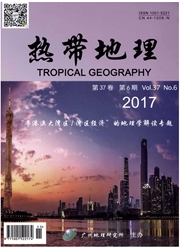

 中文摘要:
中文摘要:
水稻种植过程中,常具有浓厚的环境适应的特征。分布在不同地貌区的壮族是典型的稻作民族,已充分意识到所在地区气候、土壤等自然地理环境对水稻种植的深刻影响。为适应自然地理环境,发挥最大的生产效益,山居壮族多选择种植生长期较长、耐寒、耐肥的粳稻为主;在平原丘陵地区的壮族则以种植生长期短的籼稻居多;为适应岩溶山区干旱少水、不利于灌溉的环境,当地壮族则多种陆稻,但由于陆稻口感不佳以及所在地区人地关系由宽趋紧,导致陆稻在壮族种植结构中的地位不断下降。此外,壮族在生活中对水稻用途的定位,也影响到水稻品种的选择与种植。
 英文摘要:
英文摘要:
The Zhuang is a typical rice planting nationality in China. Rice planting in the Zhuang area is characterized by its strong adaptation to the environment. In different geomorphic regions, the Zhuang people have been fully aware of the profound influence of natural geographical environment, climate and soil on rice planting. In order to adapt their planting to the natural geographical environment and achieve maximum production efficiency, the Zhuang people who live in mountain area always choose to plant Japonica rice which grows for a longer growth period and is cold-resistant and infertility-endurable, while those who live in river valley and hilly area always choose to plant indica rice which grows for a shorter period . In Karst mountain areas suffering from water deficiency and drought, the local Zhuang people usually plant upland rice. However, as the upland rice tastes poor and the relation between people and land is changing from comfortable to tight, the upland rice planting status is falling in Zhuang’s planting structure. In addition, the position of the rice used in Zhuang’s life also affects the selection and planting of rice varieties.
 同期刊论文项目
同期刊论文项目
 同项目期刊论文
同项目期刊论文
 期刊信息
期刊信息
